With strains of sheep scab mites that are resistant to injectable wormer products now present in NI, and concerns that mobile shower units will not lead to a complete kill of the mites, there is renewed interest in the plunge dipping of sheep.
Having bought a mobile plunge dipper in August 2021, Aughnacloy sheep farmer Kenny Little has already managed to grow a customer base.
He initially invested £10,500 in the dipper, which was sourced in Scotland, and with 1,000 Easycare ewes on the farm, knew that he would be able to put it to good use, irrespective of whether others wanted dipping done or not.
“There are a lot of people wanting dipping done now. They are moving away from showering. I am booked up the next couple of weeks. I have been all over the country. It has built up by word of mouth,” says Kenny.
He has also had some farmers referred to him by local vet Paul Crawford, who chairs the NI sheep scab group, and who recently played a lead role in securing £220,000 of grant funding towards a project in NI.
Under the initial phase of the project, managed by Animal Health and Welfare NI (AHWNI), there is a budget for around 100 flocks with scab outbreaks to receive testing, advice and treatment for up to 500 ewes each.
A series of information events are also planned for all NI flock keepers this autumn.
OP dip
Research shows that the scab mites are still susceptible to an organophosphate (OP) based dip product.
The only OP-based dip available in the UK is Gold Fleece, and it is only licensed for use in plunge dippers, amid concerns that if it is used in shower units, it could lead to resistance developing, as not all mites are killed.
Notifiable
Where farmers suspect sheep scab, they should contact their local vet for advice and are also required under law to inform DAERA as it is a notifiable disease.
Kenny believes that this legal requirement has, in some respects, been counterproductive.
“There is a fair bit of scab in the country. I think in the past, people were nearly afraid to say anything, but that is changing now and farmers are more open to admit they have a problem,” he maintains.
He believes that the main initial source on many farms is bought-in sheep, in particular store lambs.
Twice
When it comes to dipping, he emphasises that the sheep must stay in the bath for a minute and should be plunged twice.
“I have seen dippers where the door in the bath has been taken away to speed up the process. The sheep need to be in a minute and you must make sure the operator is using the right dip as well,” he advises.
The bath in his dipper holds 1,200l of water, and he normally asks farmers to have a cube filled before he arrives. The bath is then kept topped up with a hose. It holds three sheep at a time, so he can get through 180 sheep per hour where they are kept pushed up. In his experience, a 5l drum of Gold Fleece normally does around 600 sheep.
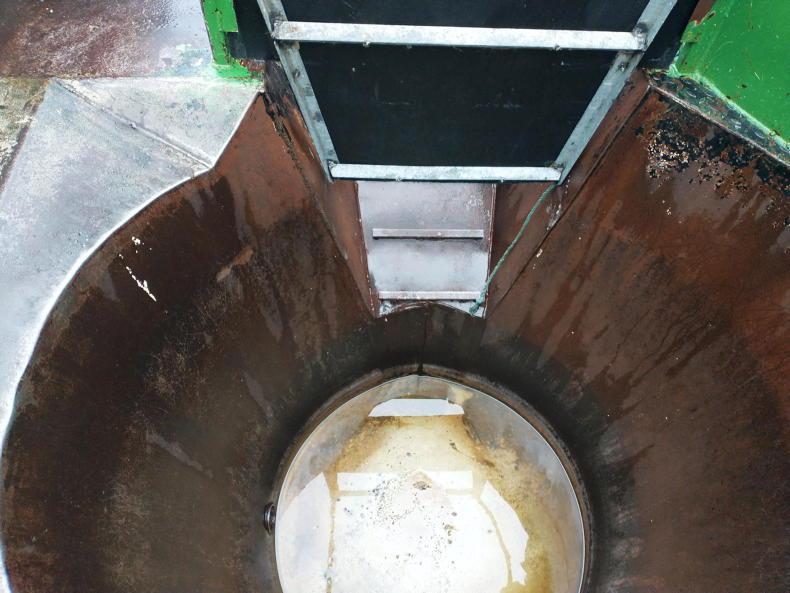
The bath on the mobile plunge dipper holds 1,200l of water.
The sheep should be at least three weeks post-shearing, and farmers should also make sure they have an authorisation approved by the NI Environment Agency (part of DAERA) to safely dispose of the dip.
“It has to be emptied at every farm. The farmer has to have somewhere to go with it. I can’t take the water with me,” adds Kenny.
Irrespective of whether he is dipping 40 sheep or 400, he has to set up the bath, so there is an initial charge of £40.
After that, it is normally around £1 per head depending on numbers.
With strains of sheep scab mites that are resistant to injectable wormer products now present in NI, and concerns that mobile shower units will not lead to a complete kill of the mites, there is renewed interest in the plunge dipping of sheep.
Having bought a mobile plunge dipper in August 2021, Aughnacloy sheep farmer Kenny Little has already managed to grow a customer base.
He initially invested £10,500 in the dipper, which was sourced in Scotland, and with 1,000 Easycare ewes on the farm, knew that he would be able to put it to good use, irrespective of whether others wanted dipping done or not.
“There are a lot of people wanting dipping done now. They are moving away from showering. I am booked up the next couple of weeks. I have been all over the country. It has built up by word of mouth,” says Kenny.
He has also had some farmers referred to him by local vet Paul Crawford, who chairs the NI sheep scab group, and who recently played a lead role in securing £220,000 of grant funding towards a project in NI.
Under the initial phase of the project, managed by Animal Health and Welfare NI (AHWNI), there is a budget for around 100 flocks with scab outbreaks to receive testing, advice and treatment for up to 500 ewes each.
A series of information events are also planned for all NI flock keepers this autumn.
OP dip
Research shows that the scab mites are still susceptible to an organophosphate (OP) based dip product.
The only OP-based dip available in the UK is Gold Fleece, and it is only licensed for use in plunge dippers, amid concerns that if it is used in shower units, it could lead to resistance developing, as not all mites are killed.
Notifiable
Where farmers suspect sheep scab, they should contact their local vet for advice and are also required under law to inform DAERA as it is a notifiable disease.
Kenny believes that this legal requirement has, in some respects, been counterproductive.
“There is a fair bit of scab in the country. I think in the past, people were nearly afraid to say anything, but that is changing now and farmers are more open to admit they have a problem,” he maintains.
He believes that the main initial source on many farms is bought-in sheep, in particular store lambs.
Twice
When it comes to dipping, he emphasises that the sheep must stay in the bath for a minute and should be plunged twice.
“I have seen dippers where the door in the bath has been taken away to speed up the process. The sheep need to be in a minute and you must make sure the operator is using the right dip as well,” he advises.
The bath in his dipper holds 1,200l of water, and he normally asks farmers to have a cube filled before he arrives. The bath is then kept topped up with a hose. It holds three sheep at a time, so he can get through 180 sheep per hour where they are kept pushed up. In his experience, a 5l drum of Gold Fleece normally does around 600 sheep.

The bath on the mobile plunge dipper holds 1,200l of water.
The sheep should be at least three weeks post-shearing, and farmers should also make sure they have an authorisation approved by the NI Environment Agency (part of DAERA) to safely dispose of the dip.
“It has to be emptied at every farm. The farmer has to have somewhere to go with it. I can’t take the water with me,” adds Kenny.
Irrespective of whether he is dipping 40 sheep or 400, he has to set up the bath, so there is an initial charge of £40.
After that, it is normally around £1 per head depending on numbers.






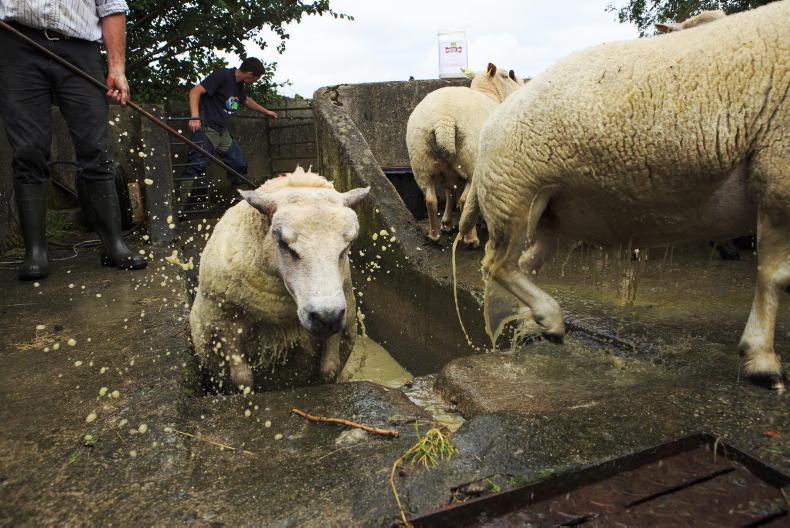
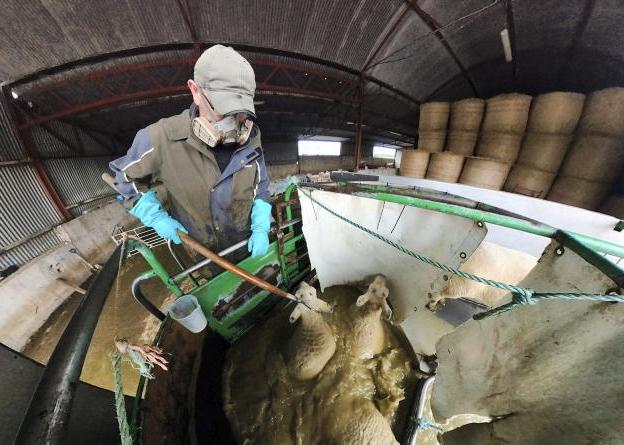
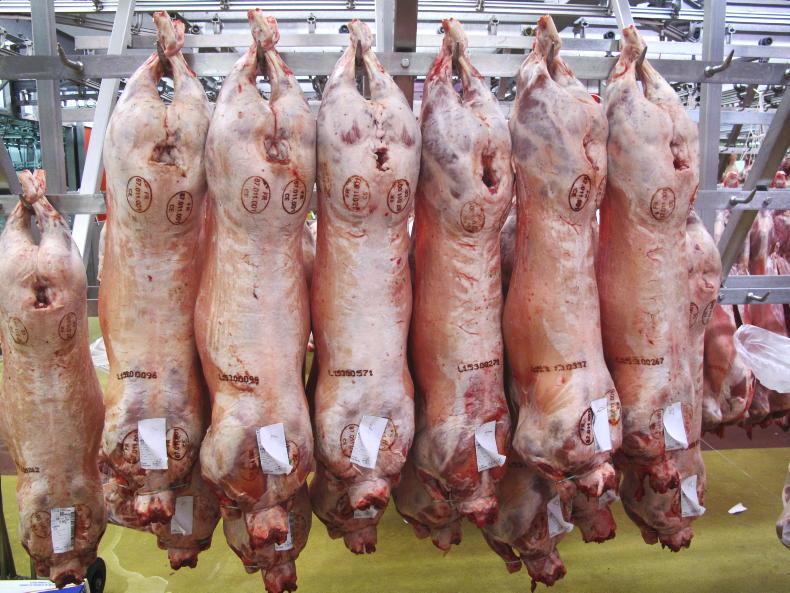
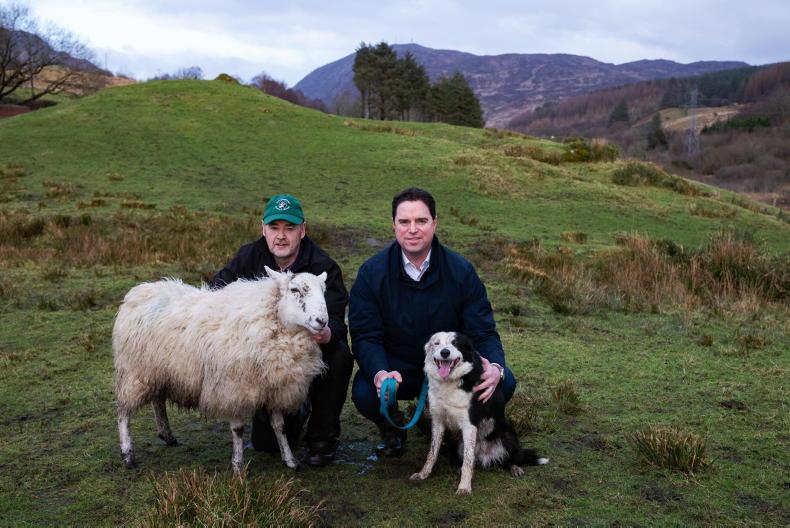
SHARING OPTIONS